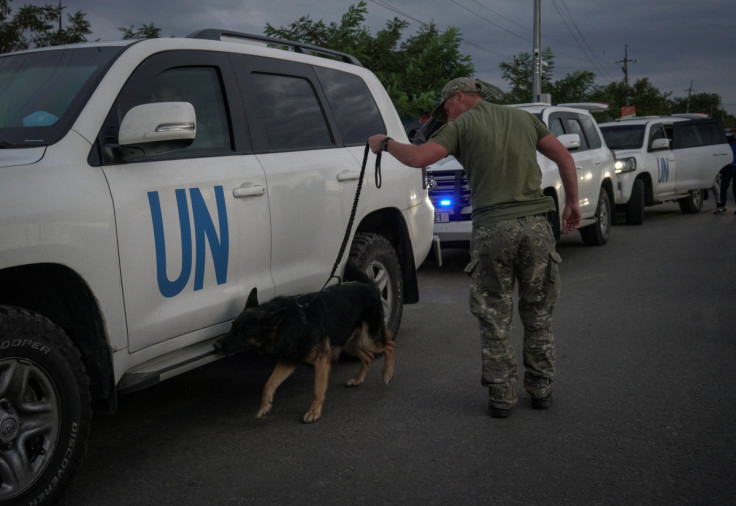Here's What Could Happen If Ukraine's Zaporizhzhia Nuclear Plant Explodes

KEY POINTS
- A nuclear weapons expert warned that a disaster in ZNPP would be worse than Chernobyl
- Zaporizhzhia nuclear plant's reactors would melt down if its water supply got cut off
- The ongoing war could pose a challenge in treating people exposed to radiation
Ukraine and the rest of the world anticipate a potentially catastrophic explosion at Europe's largest nuclear power plant currently held by Russia.
Experts have already warned that an explosion at the Zaporizhzhia nuclear power plant (ZNPP) could be equivalent to the Chernobyl disaster almost 40 years ago, which could engulf Europe with hazardous radiation.
Hamish de Bretton-Gordon, an expert in chemical, biological, radiological, and nuclear weapons, told CBS News that every reactor of the ZNPP is protected by a "very solid concrete core that is designed... to absorb [radiation]."
But he said a nuclear accident caused by a deep-penetrating missile deliberately fired into the nuclear plant would be "two or three times" more powerful than what happened in Chernobyl in April 1986.
Cutting off the water supply that cools ZNPP's reactors also has severe implications, MV Ramana, a professor at the University of British Columbia's School of Public Policy and Global Affairs, said in an interview with Al Jazeera.
"Reactors [need] to be constantly cooled by water passing through [them,]" Ramana said.
"If that water stream is cut out, cut down, cut off in some fashion, then the reactor could lose cooling, the fuel will start melting. It will sort of create high pressure, and the thing can explode," he added.
Ramana said the explosion would create an invisible radioactive cloud, but experts can able to monitor it through the use of "sensitive instruments that are measuring radiation levels."
While an explosion at the nuclear plant is already a cause for concern, experts are more afraid of the radiation that could go out of ZNPP.
"Even though that looks scary, [a] radiation release, in any case, would be catastrophic," Amelie Stoetzel, a Ph.D. Student in the Department of War Studies at King's College London, said.
Stoetzel noted that the direction of the radiation depends on the weather conditions, but it could affect any part of the European continent.
A nuclear disaster against the backdrop of the ongoing Ukraine-Russia conflict could pose a challenge to healthcare workers in providing necessary medical treatment for people exposed to radiation.
"So yes, there would be a lot of people rushing to hospitals and rushing to get out of the area, which would be a problem ... there would be confusion; in an ongoing war, evacuating people is extremely difficult," Stoetzel said.
The King's College London graduate student added that people who are not directly exposed to radiation but are showing symptoms of radiation poisoning could overwhelm the healthcare system.
The situation at the Zaporizhzhia nuclear plant entered its critical phase on Tuesday after Ukraine's armed forces revealed an intelligence report claiming that Russia placed "outside objects resembling explosive devices" on the roofs of its third and fourth power units.
The Ukrainian military said the placement of the explosives aims to "create a picture of shelling from Ukraine."
However, Russia turned the table to Ukraine and accused the country of plotting to attack the nuclear plant.
Russian news agencies quoted Renat Karchaa, an adviser to the head of Russia's nuclear agency Rosenergoatom, saying that Ukraine would use "long-range precision equipment and kamikaze attack drones" to attack the ZNPP. But he offered no evidence to support his allegation.
In the latest update Wednesday, International Atomic Energy Agency (IAEA) Director General Rafael Mariano Grossi said they found no "visible indications of mines or explosives" inside the nuclear power facility.
As a precaution, IAEA experts have requested additional access to ZNPP, especially on the rooftops of the nuclear plant's reactor units 3 and 4.
Grossi said the U.N. nuclear inspectors had not reported any recent shellings or explosions around ZNPP.

© Copyright IBTimes 2025. All rights reserved.






















